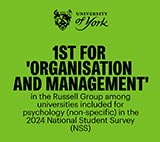
What is Psychology?
Academic psychology is a biological and experimental branch of science concerned with the mind, brain and behaviour. Because its subject matter is “human nature” it has widespread applications to healthcare, education, industry and commerce. Psychology graduates find work in a wide range of organizations that seek to understand, predict, explain or change people’s behaviour. Students gain a unique and potent combination of:
- scientific methods (in common with the other natural sciences)
- human subject matter (in common with social sciences and humanities)
- critical analysis and communication (characteristic of the arts and humanities).
Academic psychologists are scientists who use observation and experimental evidence to arrive at valid conclusions. They seek to understand the relationship between our sensations and actions but also the intervening processes that underlie human behaviour (cognitive psychology) and their development over the lifespan (developmental psychology), including interactions between people (social psychology) and psychological differences between individuals. Some researchers focus on what makes humans unique and what makes us similar to other animals (comparative psychology). Many psychologists are involved in applications of the science, for example to work (occupational psychology), to criminal justice (forensic psychology), to teaching and learning (educational psychology) and to mental and physical health (clinical psychology). A degree in Psychology provides an excellent background from which to pursue a career in wide variety of areas including research, counseling, teaching, marketing, data analysis, and health care.
Mind or brain?
Psychology was originally thought of as the science of the mind. We now know that our subjective, conscious experiences provide just one, often rather misleading, view of what is going on inside our heads. Psychologists seek an objective understanding of these processes, and this leads us to measure aspects of behaviour and, increasingly, to investigate the brain in action.
 How do we perceive, understand, remember, think, learn, decide and act? Using the latest technologies, such as Magnetic Resonance Imaging (MRI) psychologists and neuroscientists can now look inside the brain in search of the answers.
How do we perceive, understand, remember, think, learn, decide and act? Using the latest technologies, such as Magnetic Resonance Imaging (MRI) psychologists and neuroscientists can now look inside the brain in search of the answers.
Studying Behaviour
Traditionally, psychologists did not study the brain directly (this was very difficult before the invention of modern brain imaging methods), but indirectly, through carefully designed experiments to measure properties of the mind through their effects on behaviour. For example, a psychologist might investigate the processes involved in reading by measuring the time taken to respond to different words. Very often, important questions about human nature can be answered without a detailed understanding of the underlying brain mechanisms, and so behavioural approaches continue to provide the method of choice for many unsolved questions.
Studying Neuroscience
Neuroscience, which looks at the mechanisms of the brain and central nervous system, plays an increasingly important role in modern psychology. Psychologists are particularly concerned with those aspects of neuroscience that explain human behaviour and cognition, although many of these mechanisms are shared with other animals. How do our actions, perceptions, thoughts, feelings and memories emerge from networks of brain cells and the signals they send to one another? “Cognitive” neuroscience (dealing with mental processes such as perception, attention and memory) is a relatively young science, and an exciting one. Using techniques such as MRI, the current state of knowledge and discovery is advancing rapidly. The related, but much older field of neuropsychology is a branch of psychology which investigates the brain basis of cognition by looking at the effects of particular brain injuries and disease processes on different aspects of behaviour.
Example Questions in Psychology and Human Neuroscience
-
How do we interpret and use the information gathered by our senses?
-
How are different types of information organized and processed in the brain?
-
In what ways do our intellectual and perceptual faculties break-down following brain damage or disease?
-
How do we learn and remember?
-
What causes depression and how can it be treated?
-
How and why are some things forgotten?
-
How do we acquire language
-
How do we communicate verbally and non-verbally?
-
How do disorders like dyslexia and autism arise?
-
What is prejudice and where does it come from?
-
What are the psychological causes of antisocial and criminal behaviour, and how can they be prevented?
-
How do therapeutic and recreational drugs affect the brain?

Related information
- Open days
- Undergraduate accommodation
- Order a prospectus
- Computer facilities
More information
For more information on psychology, the Higher Education Academy Psychology Network (which is based in our department) has interesting information some guides and links to text books.
